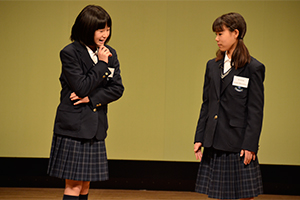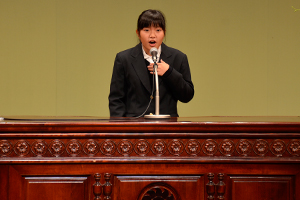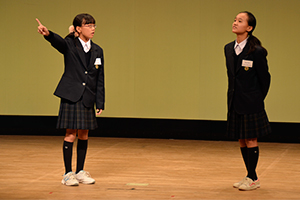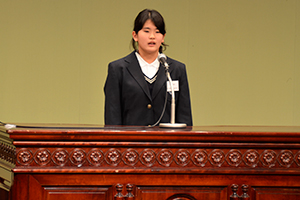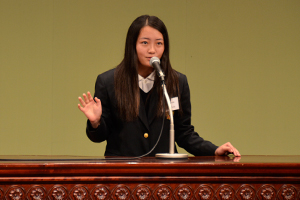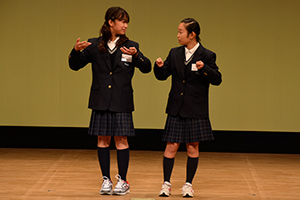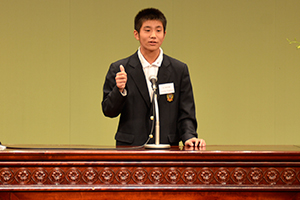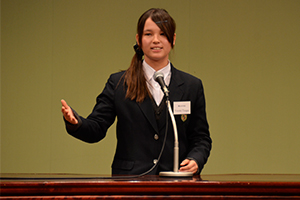第11回中学生英語スピーチ大会:受賞者一覧・英語スピーチ内容
更新日:2016年1月4日
| 氏名 | 中学校名 | 学年 |
|---|---|---|
| 島田 円香、水嶋あゆみ | 寺戸 | 1年 |
| 藤田 笑后 | 西ノ岡 | 2年 |
| 田嶋 七海 | 勝山 | 3年 |
| 氏名 | 中学校名 | 学年 |
|---|---|---|
| 坂下絵美華、伊崎 友梨 | 勝山 | 1年 |
| 長澤 依子 | 寺戸 | 2年 |
| 上出 梨乃 | 西ノ岡 | 3年 |
| 氏名 | 中学校名 | 学年 |
|---|---|---|
| 酒井菜々子、山岸 由佳 | 寺戸 | 1年 |
| 杉谷 洋輔 | 西ノ岡 | 2年 |
| 番 尚美 | 勝山 | 3年 |
英語スピーチ内容
M: Hi, Ayumi. Did you enjoy your trip to Tokyo?
A: Yes, I did.
M: Did you go to your friend’s house?
A: No, but we visited the SKY TREE together.
M: The SKY TREE? What’s that?
A: It’s a very popular place in Tokyo.
M:Did you buy anything for your family or friends as a souvenir?
A:Yes, of course. I bought a lot of cakes.
M:Could you give me some?
A:Sure, but I have many kinds of cakes.
Here they are. What cakes do you like?
M:I like sky tree one, Tokyo tower one. And Disney Land one.
A:Stop. You can’t get them all.
M: やあ、アユミ。東京への旅行は楽しかった?
A: はい、楽しかったよ。
M: 友達の家には行ったの?
A: いや、だけど、いっしょにスカイツリーに行ったんだ。
M: スカイツリー? それは何??
A: 東京でとても有名なものだよ。
M: 友達とか家族に何かお土産買ったの?
A: もちろん。いっぱいお菓子を買ったよ。
M: 私にももらえる?
A: いいよ。けど、いろんな種類があるからね。
はい、どうぞ、どのお菓子がいい?
M: このスカイツリーのでしょ、東京タワーのでしょ、それからディズニーランドのも。
A: 待って、待ってよ。全部はあげられないよ。
内容は、著作権上の理由により、掲載しておりません。
Important things are not only in text books but also outside of textbooks. I've learned about it 2 years ago. Have you ever heard of Chuuk ? It's an island in the Pacific Ocean. During World War 2, Japan used it as a base.
I'm a member of Girls Scout and we received an invitation from National Institution for Youth Education for cultural exchange.
At first I didn't want to go because it was not a familiar place and it was said to have a lot of earthquakes. But as my mother told me, “It'll be a good experience for you and Japan has more earthquakes.” So I applied for it and several days later, I was accepted.
In spite of my worries, I had a good time and made many Japanese and foreigner friends. I also learned a lot about the history between Chuuk and Japan.
About 120 years ago, Mori Shoben went to Chuuk. This is the beginning of the relationship between Chuuk and Japan. Shoven was from Kochi. He married a Chuuk woman and had six boys and five girls. And now his descendants are about 3000 to 4000. He is respected by his descendants.
On the other hand, Japan has left painful memories to the islanders. The high school I visited had a classroom with a hole on the ceiling, and bumpy walls made in the battles while Japan occupied Chuuk during the war. The islanders use some Japanese words such as "Sensei (teacher)" "Denki (lights)" "Kyuuri(cucumber)" and more. The most interesting Japanese word is "Kikkoman". It means soy sauce in Chuuk.
Although Japan gave sad memories to the people in Chuuk, I was impressed that they welcomed us with big smiles. They were always smiling to us. I've learned a lot about Chuuk, especially from their kindness and smiles. The feeling was so warm and friendly that it cannot be easily explained in words. After this experience, I believe if you try to approach people with a gentle and sincere heart, they can really feel it and their friendship can be developed. I want to do the same to the people around me.
大切なことは教科書の中だけじゃなく、教科書の外側にあります。私は2年前にこのことを学びました。あなたは今までにチュークという言葉を聞いたことがありますか?太平洋にある島です。第二次世界大戦の間、日本はチュークを基地として使いました。
私はガールスカウトの一員で、私たちは若者の教育のための国際機関から文化交流の招待を受けました。
初め、親しみのある場所ではなかったし、たくさん地震があると言われていたので、行きたくなかったです。しかし、私の母は私に言いました。「あなたにとってよい経験になるし、日本はもっと地震がある」と。だから私は応募し、数日後私は受け入れられました。
私の心配にも関わらず、私は楽しい時間をすごし、たくさんの日本人と外国人の友達を作りました。わたしはまたチュークとの日本の歴史についてもたくさん学びました。120年前、森小弁という人がチュークに行きました。これが日本とチュークとの関係の始まりです。彼はチュークの女性と結婚し、男の子を6人、女の子を5人もうけました。そして今彼の子孫は約3,000人から4,000人います。彼は子孫によって尊敬されています。
一方で、日本は痛ましい記憶を島民に残しました。私が訪れた高校には、戦争中日本がチュークを支配していたときにできた天井に穴があいた教室や戦闘によってできた穴だらけの壁が残っています。島民たちは「先生」、「電気」、「きゅうり」などの日本語を使います。一番おもしろい日本の言葉は「キッコーマン」です。それはチュークでは醤油を表します。
日本はチュークの人々に悲しい記憶を残したけれども、私は彼らが素晴らしい笑顔で私たちを迎えてくれたことに感動しました。彼らはいつも私に笑いかけてくれました。私はチュークから、特に彼らの優しさと笑顔からたくさん学びました。心というものはとても温かく友好的なので言葉では簡単に説明することができません。この経験のあとで、人に対して優しく誠実な心で接しようとするなら、心は相手に伝わり、交友関係は広くなるだろうと信じています。私は自分の周りにいる人々に対して同じように接したいと思います。
A: Excuse me, where's the Katsuyama hospital?
B: Oh, it's on Muko street.
A: Is that far from here? Do I take the bus?
B: Don't worry, it's near! Turn right at the pet shop and go straight.
A: That pet shop on the corner?
B: Right! Then walk about five minutes.
A: Is the Katsuyama hospital on the left or the right?
B: On the left, next to the Chinese restaurant.
A: Thank you. So turn left at the pet shop and turn right at the Chineserestaurant, right?
B: No, no!! Turn right at the pet shop and go straight.
A: Ummm... And then turn left or right at the corner?
B: Ah! OK!! I'll take you there!!
A: Yeah!! Thank you so much!!
A: すみません、勝山病院はどこですか?
B: あぁ、それなら向日通りにありますよ。
A: ここから遠いですか?バスに乗る必要はありますか。
B: 心配ないですよ、近くです。ペットショップで右に曲がって、まっすぐ進んでください。
A: あの角のペットショップ?
B: そうです! それから約5分歩いて。
A: 勝山病院は左側ですか、それとも右側ですか。
B: 左側で、中華料理店のとなりです。
A: ありがとう。つまりペットショップで左に曲がって、それから中華料理店で右に曲がった らいいの?
B: ちがう、ちがう! ペットショップで右に曲がって、まっすぐ進むの!
A: うーん。それから角を左だっけ? それとも右?
B: あー!! いいわ! 私がつれていく!!
A: やった! ありがとう!
内容は、著作権上の理由により、掲載しておりません。
I once heard this saying : to make your dream come true, you should keep making efforts, and never give up. I agree with this idea. I believe that making efforts without giving up is the only way to realize your dream. Do you have a dream? I do. My dream is to be an actress. An actress who inspires people to dream. An actress who can impress and convey emotion to people.
What made me decide to be an actress was the play which I took a role in at the kindergarten festival. I was given a role as an angel. Although I had only a few lines, the role was very important, because the angel had to appear at the right time during the play. As the day of the time approached, I became less worried about my performance, but still felt tense.
But when the day came at last, I felt twice as tense as before. When I appeared on the stage, the whole audience looked at me. As I said my lines with courage, everyone there began to smile. It gave me goose-bumps. I had never had such a feeling before.
After the play, I was praised by my homeroom teacher and my parents. “You’ve really grown up.” they said. Thanks to that experience. I realized the joy of expression.
I have something I want to communicate to people as an actress. That is the importance of thanking other people. We have to support one another to live. Let me take my life for example. I get a lot of help from my mother. When I wake up in the morning, breakfast is ready for me. When I return home from school, the house is clean and dinner is ready. Without her, life would be hard. School life would be boring without my friends and teachers. I thank them for supporting me.
When you thank the people around you, they will help you and lift your spirits. They give us energy and more courage to do something. Our earth will be a good place to live on if more people all over the world express more thanks to each other. When you get back home today, say to your family, “Thank you for what you do for me.” I am sure the world around you will change for the better.
こんなことわざを聞いたことがあります。「ゆめを実現させるためには、努力し続けることと、決してあきらめないことです」私もこの意見に賛成です。あきらめないで努力することが、夢を現実にさせるたった一つの方法だと信じています。あなたには夢がありますか?私にはあります。私の夢は女優になることです。人々を励まして夢をもたせられる女優。人々を印象付けて、人々に感情を伝えられる女優です。
私が女優になろうと思ったきっかけは、幼稚園のお遊戯会で演じた時のことです。私は天使の役を与えられました。セリフはほんの少しでしたが、その役はとても重要な役でした。なぜならその天使は劇中とても大事なところで登場する役だったからです。劇当日が近づくにつれて、私は自分の演技に対する心配は薄れていきました。でもまだ緊張していました。
けれど、ついにお遊戯会当日がやってきた時、私はそれまでに増して緊張していました。私がステージに登場した時、観客のみなさんが私を見ました。勇気を出してセリフと言うと、そこにいたみんなが笑顔になりました。私は鳥肌がたちました。そんな感情はそれまでに感じたことがありませんでした。
劇のあと、担任の先生と両親が私をほめてくれました。「本当に成長したね」と彼らは言いました。その経験のおかげで、私は表現することの喜びを知りました。 私には女優として人々に伝えたいことがあります。それは、他の人々に感謝することの大切さです。私たちは生きるためにお互いに支え合わなければなりません。私の生活でたとえてみます。私は多くを母の助けに頼っています。朝起きると朝食が用意されています。学校から帰ると家は掃除してあり、夕食が用意されています。母なしでは生活は大変でしょう。同時に友だちや先生なしでは、学校生活はとても退屈でしょう。私の支えになってくれて、本当に彼らに感謝です。
あなたがあなたの周りの人々に感謝すれば、彼らは手助けしてくれあなたを元気づけてくれるでしょう。彼らは私たちにエネルギーや何かをするのにもっと勇気を与えてくれます。もし世界中のもっと多くの人々がお互いに感謝の気持ちを表せば、私たちの地球は住むのにいい場所になるでしょう。今日、帰宅したら家族に、「私のためにしてくれてありがとう」と言ってみてください。きっと、あなたの周りの世界が良くなるでしょう。
A: Here we are. This is Muko city Gekikara arcade.
B: It’s very crowded.
A: Yes. It’s usually like this. Come this way. Let’s have Gekikara food.
B: What are they doing in the kitchen?
Are they making Gekikara crepe?
A: No, they’re not. They are making Gekikara Okonomiyaki.
Gekikara Okonomiyakis are popular in Muko city here.
And this is one of the Gekikara restaurants.
B: Oh, great. Let’s try to eat.
A: Two Okonomiyaki, please.
B: Ah, this is too hot!
A: Water, water please.
B: Oh, Finally we finished.
A: OK! Let’s go to the next restaurant.
B: What?? Are you kidding?
A: さあ、着いたぞ。ここが向日市の激辛商店街だ。
B: とても混んでるね。
A; うん。いつもこんな感じだよ。こっちに行こう。激辛料理を食べようよ。
B: 台所で彼らは何をしているの。激辛クレープ作っているの?
A: いや、違うよ。彼らは激辛のお好み焼きを作っているの。
激辛のお好み焼きはここ向日市で人気だからね。
それで、これは激辛レストランの1つだよ。
B: すごいね。食べてみようよ。
A: お好み焼きを2つください。
B: あー。これは辛い。
A: 水、水をください。
B: やっと食べ終わったぞ。
A: OK。じゃあ次のレストランに行こうよ。
B: なんだって?冗談でしょ?
内容は、著作権上の理由により、掲載しておりません。
Sakura, Samurai, and Sushi say Japan to many foreigners. But what does Kyoto say to me? In junior high, Kyoto says History, which says Tests. I've tried remembering all the names and dates but actually, history's become a joke to me. I like to say, “Since I don't have Doraemon's time-slip, why should I care about the past?”
Still, I have fond memories of my past. In kindergarten, I often went to a park with lots of sakura. And in elementary school, my class got lost in Kyoto. No sakura, no samurai, and no sushi, but there was a Starbuck's nearby.
Now in junior high, I'm into Kyoto's wagashi. I can walk the Philosopher's Path for yatsuhashi. I'll climb Daimonji for sasa-no-tsuyu, and for ayugashi, I would swim the Katsura River. I wonder what Doraemon would do for a Kyoto dorayaki?
This year, instead of Doraemon, I've been watching the Taiga Drama, Yae no Sakura. It's got me thinking Kyoto is more than a city of sakura, samurai, and sushi. It's the people. Take Yae Yamamoto, the samurai girl in the drama from Fukushima. She lost everything, but did not give up. She came to Kyoto and wrote its first English guidebook, set up a school, and became a nurse and a tea master. She has given Kyoto so much.
A saying in the Taiga Drama is, “the world is revolving.” Revolving isn't just going forward, it is a cycle, with a center. Can a city be the center, like a magnet, connecting the past to the present to the future?
Recently, Kyoto is home to people relocating from Fukushima after the nuclear crisis. They've come to play outside, make new friends, and start new, just like Yae Yamamoto. You can find sakura trees, samurai castles, and delicious food in lots of places in Japan, but what I think makes Kyoto special are its people. In such a fine city, we don't need to take Doraemon's time-slip to care about its past and future. I care, and I want to give to Kyoto's future.
桜、侍、寿司が日本を表すと外国人はよく言う。では、京都は私にとって何を意味するだろう? 中学での京都とは歴史を指し、それはテストへと繋がる。名前や日付けをどれだけ見つめても覚えようとしても、実際には私には何の意味もないように思える。「ドラえもんのタイムマシンは無いわけだし過去を知る必要はないやん」が私の口癖だった。
しかし個人的な過去はよく思い出す。幼稚園の時、桜が沢山ある公園によく行っていたこと。小学生の時、『京都巡り』で丸太町で迷子になり、桜も侍も寿司もない所にスターバックスだけはあったこと。
そして中学生になって、京都の『和菓子』に興味がわき始めたこと。私はいつの間にか、「八つ橋のためなら哲学の道も歩ける、笹のツユのためなら大文字を登れる、鮎菓子のためなら桂川も泳げる」と思うほど好きだった。だったらドラえもんは『京都どら焼き』のためなら何をしようと思うだろう。
今年に入ってから私はドラえもんより大河ドラマの『八重の桜』を見始めた。初めて京都は桜、侍、寿司以上の素晴らしい町である事に気づいた。その素晴らしさの鍵は人だった。福島県出身の侍少女、山本八重をとりあげてみよう。戦争で全てを失ってもけして諦めなかった彼女は京都初の英語ガイドブックを作り、学校を創立し、看護婦、そして茶道の先生にもなるなど、京都に多くのものを与えた。
『世界は循環している』ということわざが大河ドラマにあるが、循環とは前に進む直線ではなく中心のある輪のことだ。では町が磁石のように過去と現在と未来を引き寄せる中心となることは可能だろうか。
京都は近頃、福島の原発事故から逃れてきた人々の新しい家になっている。外で遊び、新たに友達を作り、新しくやり直すために、山本八重のように京都にやって来るのだ。
桜や城、美味しい食べ物は日本各地で見られるが、京都には特別な人々が集まってくる気がする。この魅力的な京都の過去や未来を尊重するのに本当にドラえもんのタイムマシンが必要だろうか。少なくとも私はこの町を誇りに思い、その未来へ捧げたい。

-
教育委員会 教育部 学校教育課
電話 075-931-1111(代表) ファクス 075-931-2555
教育委員会 教育部 学校教育課へのお問い合わせ

